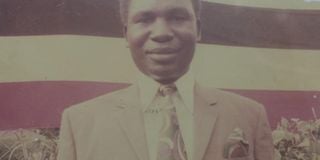Prime
Brig Arube’s failed coup plan

Late Brig Charles Arube
What you need to know:
Struggle. Determined to be reinstated to his office and end the brutality in Amin’s government, Brig Charles Arube held meetings with his colleagues but he died before he could achieve his dream. Faustin Mugabe sat down with an ex-army official who remembers what went wrong.
On February 5, 2013, the remains of Brig Charles Arube were reburied at his ancestral home in Lombe village, Koboko Town Council in Koboko District.
Less than a kilometre from Arube’s grave, Idi Amin’s father was buried. President Museveni, who facilitated the exhuming and reburial of Arube also attended the burial.
Brig Arube had been buried at Burma military cemetery in Jinja District in March 1974 following his mysterious death shortly after the failed March 23 - 24, 1974 coup against Idi Amin.
The attempted coup was instigated by Arube’s desire to rout all foreigners in the Uganda Army (UA) and Amin who were brutalising people, especially Ugandans.
The foreigners, who had infiltrated the army, were from Rwanda, Zaire (DR Congo), Kenya and Sudan not only belittled Ugandan officers and soldiers, but also brutalised civilians.

Retired Uganda Army officer, Lt Col Moses Galla narrates the events surrounding Brig Arube’s death. PHOTO BY FAUSTIN MUGABE
Amin and Brig Malera caused Arube’s to attempt a coup. It was Gen Amin’s indecision to act on Brig Hussein Malera’s misconduct particularly towards Brig Arube and his close friend Lt Col Elly Aseni that prompted Arube to attempt to instigate a coup which he thought was the only solution to end the injustice Ugandans faced. So how did it start? From Koboko Town, Uganda Army UO: 606 retired Lt Col Moses Galla told Witness how Brig Hussein Malera, a Sudanese, had provoked Arube to attempt to stage the coup.
Galla, born on July 2, 1948, and joined the UA in April 1966, was a close friend of both Arube and Aseni. “I knew Arube and Elly [Aseni] very well. Amin was related to Elly – and he [Aseni] joined the UA in 1963. Arube joined the King’s African Rifles (KAR) on September 12, 1959, with my elder brother Khemis Poru. They were recruited from Koboko, trained in Jinja and later taken to Nanyuki in Kenya,” Galla vividly recalls.
While he could not remember where Arube was posted before 1971, he recalls: “When Lt Col Arube was appointed army chief of staff, he was transferred from Gaddafi Garrison [in Jinja] to Kampala where he had been the commanding officer of the School of Infantry”.
He went on: “So after that, he was sent to the USSR [Russia] for a military High Command course for about six months and returned around March 1974. While on course, Col Hussein Malera was appointed acting chief of staff and promoted to Brigadier. When Arube returned, Malera, who had been the commanding officer of the Military Police, refused to hand over the office [of the chief of staff]”.
Arube reported the matter to president Amin, commander-In Chief, who told Arube that he would handle the matter but in vain. Frustrated by president Amin’s inaction to his concerns, Arube called his friends and colleagues for a meeting to seek their advice on the matter concerning Malera’s refusal to hand over to him the office.
While he cannot remember the day of the meeting, he recalls that he was on duty in Fort Portal when Arube called him to Kampala to attend a meeting. Where was the meeting I asked? “The meeting was held at the Officer’s Mess at Nakasero which was Uganda Club in Obote’s government,” Galla answered.
Brigadier Arube chaired the meeting. Lt Col Galla reveals that the meeting started after lunch. The following officers attended the meeting as far as Galla can recall. Lt Col Elly Aseni, Governor North Buganda Province, Lt Col Juma Ali Oka aka Butabika, commanding officer of Malire Mechanised Specialised Reconnaissance Regiment at Lubiri Kampala, Maj Moses Galla, acting commanding officer Mountains of the Moon Battalion in Fort Portal, Maj Amin Lomo, commanding officer of Air and Sea-borne Battalion in Tororo, Captain Steven Galla, General manager Kilembe Mines, Lt Enoc Maturima, tank commander of the Mechanised Specialised Reconnaissance Regiment, Lt Michael Akonyu, the acting commanding officer of the paratroopers school at Lubiri”.
In his opening remarks Arube said: “The reason for calling this meeting is, I am back from the course. I was given a 14-day pass leave; but when I returned, I found Malera in my office and when I asked him that ‘please hand over the office to me’, he refused”, Galla recalls Arube’s words.
“Lt Col Elly Aseni was the first to speak. He told him to report the matter to the commander-In-chief. Then Lt Col Juma Butabika told him that if Amin refused to listen to him, he should come to him and tell him. Mine was different. I said, sir you are the chief of staff, there is another Brigadier, Smuts Guweddeko, why don’t you approach him to see if he can talk to Malera. Arube accepted my advice and said he would give them the answer in the second meeting. I did not attend the second meeting. I was in Bugungu in Masindi overseeing the training of the mortal platoon. I was in Masindi when I received a telephone call from Juma Doka.
He said: “Galla, Arube has committed suicide”. Doka was in Tororo. But he said he did not know why and how it happened”.
Retired Captain Isaac Bakka who served in the UA recently told the Sunday Monitor in the series “attempted coups” that Amin shot Arube dead at his Command Post as the latter entered the house to arrest or kill Amin himself during the attempted coup. Amin and Arube were both Kakwa from the neighbouring villages in present Koboko District.



